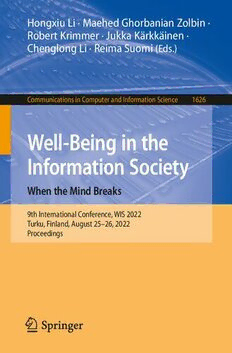
Well-Being in the Information Society. When the Mind Breaks. 9th International Conference, WIS 2022 Turku, Finland, August 25–26, 2022 Proceedings PDF
Preview Well-Being in the Information Society. When the Mind Breaks. 9th International Conference, WIS 2022 Turku, Finland, August 25–26, 2022 Proceedings
Hongxiu Li · Maehed Ghorbanian Zolbin · Robert Krimmer · Jukka Kärkkäinen · Chenglong Li · Reima Suomi (Eds.) Communications in Computer and Information Science 1626 Well-Being in the Information Society When the Mind Breaks 9th International Conference, WIS 2022 Turku, Finland, August 25–26, 2022 Proceedings Communications in Computer and Information Science 1626 EditorialBoardMembers JoaquimFilipe PolytechnicInstituteofSetúbal,Setúbal,Portugal AshishGhosh IndianStatisticalInstitute,Kolkata,India RaquelOliveiraPrates FederalUniversityofMinasGerais(UFMG),BeloHorizonte,Brazil LizhuZhou TsinghuaUniversity,Beijing,China Moreinformationaboutthisseriesathttps://link.springer.com/bookseries/7899 · · Hongxiu Li Maehed Ghorbanian Zolbin · · Robert Krimmer Jukka Kärkkäinen · Chenglong Li Reima Suomi (Eds.) Well-Being in the Information Society When the Mind Breaks 9th International Conference, WIS 2022 Turku, Finland, August 25–26, 2022 Proceedings Editors HongxiuLi MaehedGhorbanianZolbin TampereUniversity ÅboAkademiUniversity Tampere,Finland Turku,Finland RobertKrimmer JukkaKärkkäinen UniversityofTartu FinnishInstituteforHealthandWelfare Tartu,Estonia Helsinki,Finland ChenglongLi ReimaSuomi TampereUniversity UniversityofTurku Tampere,Finland Turku,Finland ISSN 1865-0929 ISSN 1865-0937 (electronic) CommunicationsinComputerandInformationScience ISBN 978-3-031-14831-6 ISBN 978-3-031-14832-3 (eBook) https://doi.org/10.1007/978-3-031-14832-3 ©TheEditor(s)(ifapplicable)andTheAuthor(s),underexclusivelicense toSpringerNatureSwitzerlandAG2022 Thisworkissubjecttocopyright.AllrightsarereservedbythePublisher,whetherthewholeorpartofthe material is concerned, specifically the rights of translation, reprinting, reuse of illustrations, recitation, broadcasting, reproduction on microfilms or in any other physical way, and transmission or information storageandretrieval,electronicadaptation,computersoftware,orbysimilarordissimilarmethodologynow knownorhereafterdeveloped. Theuseofgeneraldescriptivenames,registerednames,trademarks,servicemarks,etc.inthispublication doesnotimply,evenintheabsenceofaspecificstatement,thatsuchnamesareexemptfromtherelevant protectivelawsandregulationsandthereforefreeforgeneraluse. Thepublisher,theauthors,andtheeditorsaresafetoassumethattheadviceandinformationinthisbookare believedtobetrueandaccurateatthedateofpublication.Neitherthepublishernortheauthorsortheeditors give a warranty, expressed or implied, with respect to the material contained herein or for any errors or omissionsthatmayhavebeenmade.Thepublisherremainsneutralwithregardtojurisdictionalclaimsin publishedmapsandinstitutionalaffiliations. ThisSpringerimprintispublishedbytheregisteredcompanySpringerNatureSwitzerlandAG Theregisteredcompanyaddressis:Gewerbestrasse11,6330Cham,Switzerland Preface “WhentheMindBreaks”wasthemottooftheninthbiannualconferenceonWell-being intheInformationSociety(WIS2022).Theconferencetopiccouldn’tbetimelierthan after having endured a pandemic following the COVID-19 virus outbreak. What first seemed like an event that fostered, and even accelerated, the digital transformation in waysalmostunimaginablebefore,alsochallengedthewell-beingofthoseaffectedby isolationandlackofhumancontactmorethanever.Here,theRussianaggressionagainst Ukrainewithallitsconsequencesinsideandoutsidethewar-affectedterritoriesfurthered thesetendenciesevenmore. We felt that the topic was relevant and academic discussion around it was much needed;hence,itwasselectedasthemainthemeofthisyear’sconference,whichonce again was organized by the University of Turku in cooperation with Åbo Akademi UniversityandTampereUniversity. The submitted papers consisted of academic contributions on the topics at the intersectionofhealth,ICT,andsocietyasseenfromdifferentdirectionsandcontexts. Thankstotheinternationalreviewers,wewereabletoaccept14paperstobepresentedat theconference,whichwastobeheldinahybridwayallowingbothremoteandin-person presentations.Wearegratefulfortheeffortsofthereviewersinidentifyingrelevantand topicalresearchpapersforWIS2022. This interdisciplinary conference shows nicely how the topic of Well-being in the Information Society requires a thorough understanding of psychology, information systems,medicine,societaldevelopment,andsystemstheory.Dealingwithoneofthese issuesalone does notallowone tounderstand thecomplexity ofthe topicas awhole. Onlythecombinationofknowledge,understanding,andcontextualizationpresentsthe rich details of this topic. If the conference on Well-being in the Information Society didn’texistalready,nowwouldcertainlybethetimewhenitwouldbefoundedagain. The proceedings are structured in four sections: i) Mental Well-being and E-Health, ii) Social Media and Well-being, iii) Innovative Solutions for Well-Being intheInformationSociety,andiv)DrivingWell-beingintheInformationSociety. The first section includes four papers reflecting the issues of mental health and well-beingthroughtheuseofinformationandcommunicationtechnology(ICT).Inthe firstpaper,titled“Well-BeingofHongKongDSEStudentsinthePost-COVID-19age: Opportunities and Challenges for Mental Health Education and Promotion”, Wai Sun DerekChun,SiuHoYau,WaiManChan,andTingTingFungdiscusshowthemental healthofthestudentpopulationinHongKong,asystemwhichisknownforfocusingon examinations,wasaffectedbyCOVID-19.ThesecondpaperbyVincentPeterC.Magboo and Sheila A. Magboo focuses on “Important Features Associated with Depression Prediction and Explainable AI”, whereby they analyze how artificial intelligence can help to understand and predict being affected by depression. The third paper in this sectionbyDanaNaousandTobiasMettlerdiscussesthedilemmaaround“MentalHealth Monitoring at Work: IoT Solutions and Privacy Concerns”, where employers try to supporttheirstaffbymonitoringformentalhealthissues,whichraisesseriousconcerns vi Preface abouttheirprivacy.Inthefinalpaperofthissection,PrimaPangsrisomboon,AungPyaea, Noppasorn Thawitsri, and Supasin Liulak present the issues around mental health for Thaistudentsintheirstudytitled“DesignandDevelopmentofanNLP-BasedMental HealthPre-screeningToolforUndergraduateStudentsinThailand:AUsabilityStudy”. The second section collates three papers dealing with how social media is increasinglyaffectingoursociety’swell-being,notleastsincetheCambridgeAnalytica scandal has shown the vulnerability of our political systems, and the fears around the pitfalls of social media become more and more evident. The first of these papers is authored by Linda Achilles, Thomas Mandl, and Christa Womser-Hacker. In their paper focused on “Thinspiration Inspired by K-pop: A Comparison of K-pop Related Thinspiration Imagery and Texts to Regular Thinspiration Content on Tumblr”, they explore how social media posts on Tumblr can affect eating disorders and body dissatisfaction.Thesecondcontributiontitled“MentalHealthCommunicationonSocial MediainIndia:CurrentStatusandPredictors”,bySairajPatkiandAnikaIyer,presents the Indian experience with mental health communication in social media and how COVID-19 supported such communication. Aung Pyae and Shahrokh Nikou, in the concluding paper of this section titled “Understanding University Students’ Health Information Seeking Behaviors on Social Media During the COVID-19 Pandemic: A DevelopingCountryPerspective”addresshowsocialmediaaffecteduniversitystudents’ health(mis-)informationduringthepandemic,duetolackofalternatives. The third section provides an overview of three innovative solutions around well- being.Thefirstpaper,“ClassificationofHealthcareRobots”byRongHuang,dealswith howwecandifferentiatedifferentrobotsintheareaofhealth.Thesecondcontribution reviewshowthepoorcanuseinformationsocietytoolstoimprovetheirsituationina paper titled “Digital Solutions for the Marginalised in Society: A Review of Systems to Address Homelessness and Avenues for Further Research” by Michael Oduor. The third paper deals with virtual reality and new ways of working, titled “Investigating Students’ Engagement, Enjoyment, and Sociability in Virtual Reality-Based Systems: AComparativeUsabilityStudyofSpatial.io,Gather.town,andZoom”andauthoredby SummaSriworapong,AungPyaea,ArinThirasawasd,andWasinKeereewan. Thefourthandlastsectionprovidesaninterestinginsightintodifferentapproaches toprovidingwell-beingintheinformationsociety.ThefirstpaperbyHamedAhmadinia deals with “A Review of Health Beliefs and Their Influence on Asylum Seekers and Refugees’Health-SeekingBehavior”.Thesecondpaper,byEvaCollanus,EmiliaKielo- Viljamaa,JanneLahtiranta,andAnttiTuomisto,isontheimportanttopicof“Measuring theMaturityofHealthcareTestbeds”.Thethirdcontributionaddresses“StudyStructures intheInterplayofStressandCopinginHigherEducation”andisauthoredbyEija-Liisa Heikka,PiaHurmelinna-Laukkanen,OutiKera¨nen,andPiaPartanen.Thefinalpaperby TinaLongdealswiththeimportantissueof“WhatDrivesUserEngagementofTheme ParkApps?Utilitarian,HedonicorSocialGratifications”. We want to express our deepest gratitude to our organizing institutions that have constantly supported us with the conference in several ways. We also want to thank theFinnishFoundationforEconomicEducationforfinancialsupport,alltheauthorsfor contributions,andallthereviewersfortheirhardworktoensurethequalityofWIS2022. Further,weacknowledgethesupportreceivedthroughHorizon2020fundingwithgrant Preface vii number 857622 for the work of Robert Krimmer. Our conference management group consisting(inadditiontous)ofHongxiuLi,ChenglongLi,MaedehGhorbanianZolbin, Kaisa Mishina, Brita Somerkoski, and Tapio Vepsäläinen also deserves a big thanks. Finally,wearegratefultoSpringerforagainacceptingourproceedingsforpublication. August2022 RobertKrimmer JukkaKärkkäinen ReimaSuomi Organization OrganizingCommittee Suomi,Reima(ConferenceChair) UniversityofTurku,Finland Li,Chenglong(CommitteeChair) TampereUniversity,Finland Krimmer,Robert(Program UniversityofTartu,Estonia Co-chair) Kärkkäinen,Jukka(Program NationalInstituteforHealthandWelfare,Finland Co-chair) GhorbanianZolbin,Maedeh ÅboAkademiUniversity,Finland Li,Hongxiu TampereUniversity,Finland Somerkoski,Brita UniversityofTurku,Finland Widén,Gunilla ÅboAkademiUniversity,Finland ProgramCommittee Ameel,Maria UniversityofTurku,Finland Anttila,Maria HelsinkiUniversityHospital,Finland Athanasopoulou,Christina UniversityofWestAttica,Greece Bergum,Svein LillehammerUniversityCollege,Norway Cacace,Mirella KatholischeHochschuleFreiburg,Germany Cabral,Regis FEPRO-FundingforEuropeanProjects,Sweden Halonen,Raija UniversityofOulu,Finland Järveläinen,Jonna UniversityofTurku,Finland Krimmer,Robert UniversityofTartu,Estonia Li,Chenglong TampereUniversity,Finland Li,Hongxiu TampereUniversity,Finland Liu,Yong AaltoUniversity,Finland Mettler,Tobias UniversityofLausanne,Switzerland Mishina,Kaisa UniversityofTurku,Finland Mäntymäki,Matti UniversityofTurku,Finland Pakarinen,Anni UniversityofTurku,Finland Somerkoski,Brita UniversityofTurku,Finland Söderlund,Riitta UniversityofTurku,Finland Vold,Tone InlandNorwayUniversityofAppliedSciences, Norway Widén,Gunilla ÅboAkademiUniversity,Finland Contents MentalWell-beingandE-Health Well-BeingofHongKongDSEStudentsinthePost-COVID-19Age: OpportunitiesandChallengesforMentalHealthEducationandPromotion ..... 3 DerekWaiSunChun,SiuHoYau,WaiManChan,andTingTingFung ImportantFeaturesAssociatedwithDepressionPredictionandExplainable AI ................................................................... 23 VincentPeterC.MagbooandMa.SheilaA.Magboo MentalHealthMonitoringatWork:IoTSolutionsandPrivacyConcerns ...... 37 DanaNaousandTobiasMettler DesignandDevelopmentofanNLP-BasedMentalHealthPre-screening ToolforUndergraduateStudentsinThailand:AUsabilityStudy ............. 46 PrimaPangsrisomboon, AungPyae, NoppasornThawitsri, andSupasinLiulak SocialMediaandWell-being Thinspiration Inspired by K-pop: A Comparison of K-pop Related Thinspiration Imagery and Texts to Regular Thinspiration Content onTumblr ............................................................ 63 LindaAchilles,ThomasMandl,andChristaWomser-Hacker MentalHealthCommunicationonSocialMediainIndia:CurrentStatus andPredictors ......................................................... 78 SairajPatkiandAnikaIyer Understanding University Students’ Health Information Seeking Behaviours on Social Media During the COVID-19 Pandemic: ADevelopingCountryPerspective ....................................... 94 AungPyaeandShahrokhNikou InnovativeSolutionforWell-beingintheInformationSociety ClassificationofHealthcareRobots ...................................... 115 RongHuang
